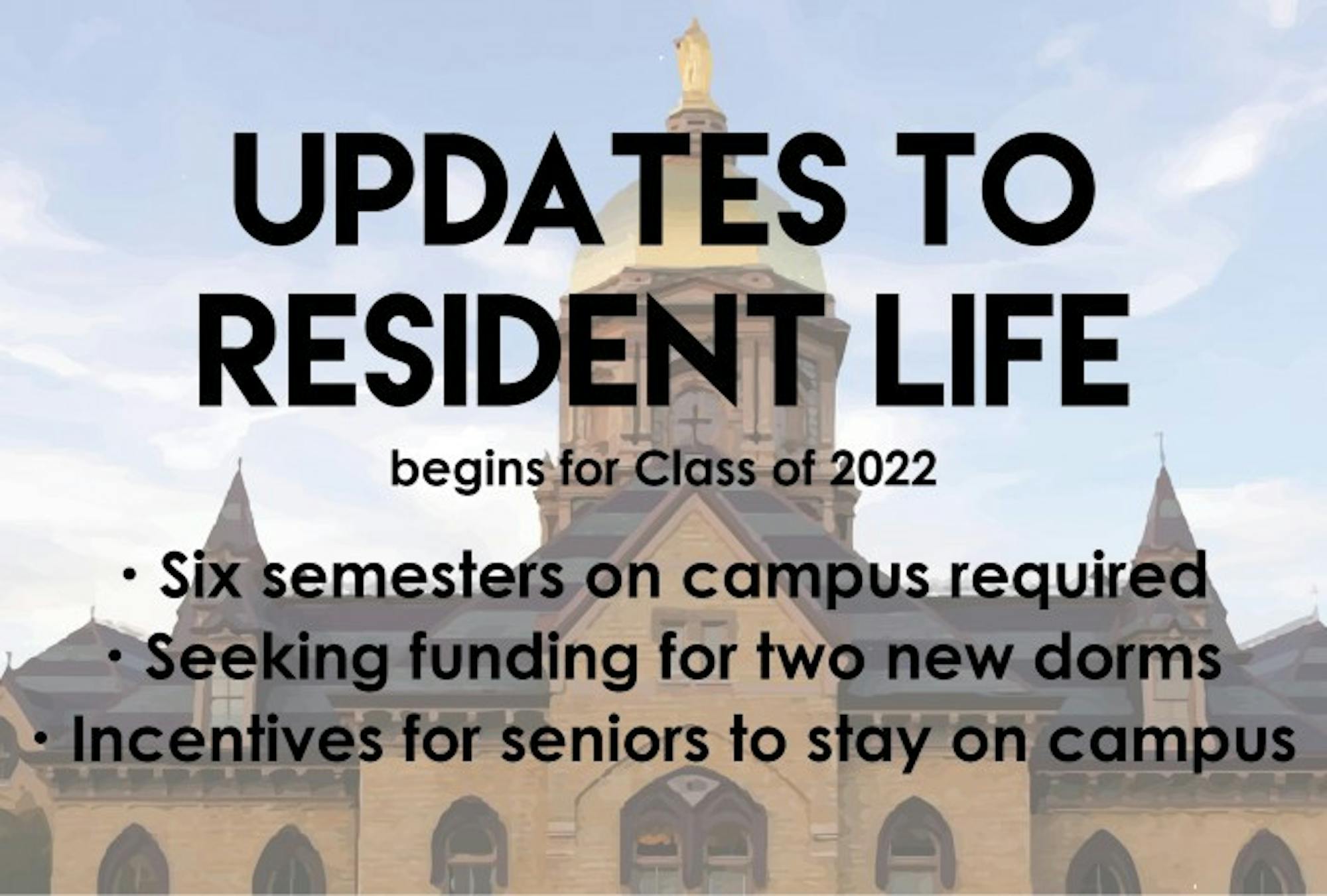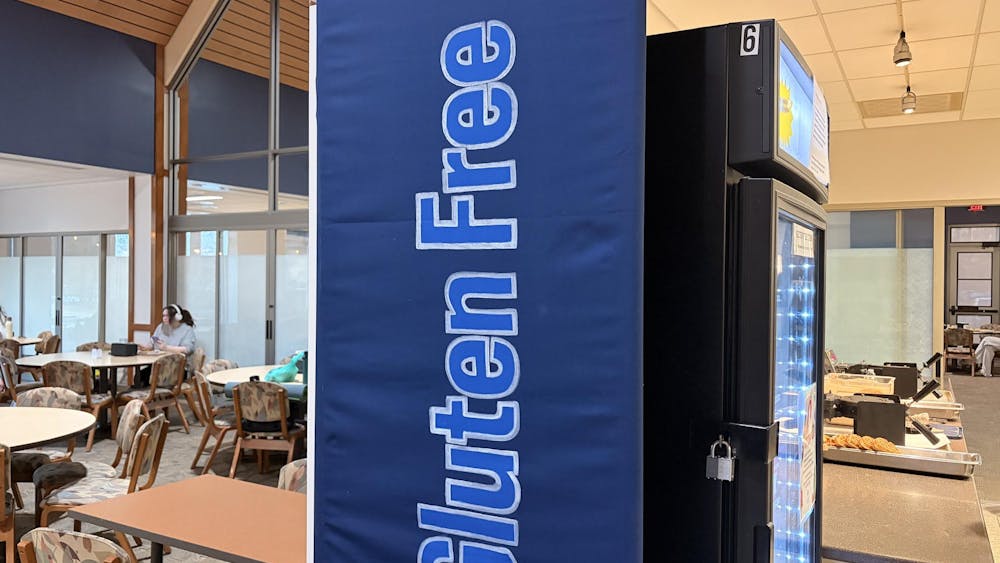Starting with the Notre Dame class of 2022, students will be required to live on campus for six semesters.
Erin Hoffmann Harding, vice president of student affairs, said the changes came after gathering student feedback as to why there was a trend for upperclassmen to move off campus.
“Student feedback was crucial to several things, I would say,” Hoffmann Harding said. “One is why students choose to move off campus, which would apply to anything in terms of the new strategies moving forward. And secondly, certainly and specifically, in terms of the incentives. We looked, as well, at external benchmarking in peer institutions.”
Brown, Duke and Georgetown all have three-year requirements, and Vanderbilt has four, Heather Rakoczy Russell, associate vice president for residential life, said. These institutions have seen high rates of student retainment as far as on-campus living, which Notre Dame hopes to replicate with establishing a six-semester requirement, Hoffmann Harding said.
The requirement is not a major adjustment to the current status quo, as only 2 to 3 percent of sophomores and 15 percent of juniors live off campus, Hoffmann Harding said.
Rakoczy Russell said she believes in carrying out this change because of “the formation that happens in [Notre Dame’s] residence halls.”
“I would say that so much of what I was taught about my values and who I felt I was called to become and who I was to become happened as a result of living in community,” she said. “It’s not always pretty — it happens by difference and challenge and conflict resolution, and some of that happened as a result of what you may describe as ‘the bubble,’ the spirit and the traditions that grow up. … If people think of it as the bubble, I would say this: Cherish the bubble, because it’s very fleeting.”
By adding this requirement, one of the priorities of the department is to alleviate overcrowding in dorms, and as such, the University will seek funding for two new residence halls.
“Opening Dunne and Flaherty last fall was such a huge step for us, realizing and taking care of that challenge on campus for our students,” Hoffmann Harding said. “And then the second one was really thinking about hall renewals and how we could make that cycle faster and do more work to some of our historic halls, because we knew they needed it and students would desire that. So once we had those two problems and challenges really addressed, we could turn our attention to something that had long worried us. But we weren’t able to be proactive because we didn’t have space available in the residence halls.”
One of the prospective new dorms will be located west of Ryan Hall, and the other will likely be located on the quad near Dunne and Flaherty, Hoffmann Harding said.
“We’re planning and hoping for 250 beds for the one west of Ryan and 225 for the one on the north side of campus,” Hoffmann Harding said.
Pangborn will remain a swing dorm as the University continues to do renovations on some of the more “historic” dorms on campus, Hoffmann Harding said. While Morrissey will be the next dorm to undergo major renovations, Hoffmann Harding said they hope to announce the dorm set to follow Morrissey this school year.
Rakoczy Russell said the University will be focusing on one major year-long dorm renovation and one minor summer-long dorm renovation per year for a 10-year cycle.
“We intentionally haven’t announced what the order [of dorms] is because each year we’re doing assessment of the conditions, which could change. So we don’t want to give wrong expectations for a hall,” Rakoczy Russell said.
In addition to the six semester requirement, Hoffmann Harding said they are hoping to incentivize seniors to stay on campus.
“Some seniors were choosing to move off campus because they were perceiving that they wouldn’t be able to be near their friends,” Hoffmann Harding said. “So, if that is true, that’s actually something we can fix, and to say in room picks, typically, rectors will often freeze certain rooms for first-year students so that they’ll be integrated into the section. If that makes the difference between them going off and staying on, we want to change that process. It’s not full autonomy for room picks, it’s what specifically can we change in room picks to retain upperclass students, but specifically targeting seniors.”
Some financial incentives may also be given to seniors staying in their dorm.
“For instance, we’re kicking around the idea that if you were to express a preference for living on campus as a senior, as a sophomore, might the University have an ability to be able to guarantee a room cost for you or, recognizing the value of having seniors on campus, have a reduced room cost for students who express that preference early,” Hoffmann Harding said. “It’s something we want to consider and offer and, again, gather feedback to see would that be helpful to students as they’re navigating this conversation with peers or developers in the local market, appropriately weighing on-campus and off-campus offers for seniors.”
Additionally, Hoffmann Harding said they have heard an overwhelming response from seniors for a flexibility in meal plans.
“We’ve had great collaboration with food services throughout this process in terms of exploring more flexible dining options, perhaps akin to what’s available to off-campus students now,” Hoffmann Harding said. “So only purchasing a certain number of meals, or perhaps having more Flex Points or Domer Dollars as they think about that, but also having more facilities available to students.”
Rakoczy Russell said they also hope to mitigate some of the stress of signing leases to live off campus early.
“Last year to my horror, I heard this story happening with first-year students, first-year students who were being targeted and being told that fall break was really the latest possible time they could sign for their senior year, which is absurd, right?” Rakoczy Russell said. “But if that’s the story they’re hearing, it’s being told in a convincing way. It’s part of what we’re trying to get people to pause long enough and to ask good questions and become educated and realize that’s actually not true. But that will only happen if we start to change the story, and maybe financial incentives will get people to pause long enough to really be very thoughtful about that decision.”
Students studying abroad in a Notre Dame program will be able to count their semester abroad as one “on campus,” Hoffmann Harding said.
“We want to talk to students, we want to talk to Notre Dame International to better understand the other experiences that students have,” Hoffmann Harding said. “There are occasions, for example, where students might enroll in another university other than Notre Dame to take advantage of study abroad, so we have to think about that in context of transfer students who want to live on campus, as well as other readmitted students returning and work that through in the details. It’s not solidified, but a point of further conversation.”
Rakoczy Russell said the University also hopes to develop more consistency in policy across the dorm system, and decisions as to what will fall under the discretion of rectors will be informed by student feedback.
“I wouldn’t say it’s as simple as rectors have no discretion and everything should come centrally. I think that would be ruining part of what is so special about our model, and that is the role of the rector,” Rakoczy Russell said. “But should there be some things that are universally done that students have expectations and know what they can count on, then yes. … The dance or the delicate balance of it will be informed by students, so we need to listen well to students to say where should rectors have discretion, what are those things that should be more regulated.”
Read More
Trending









